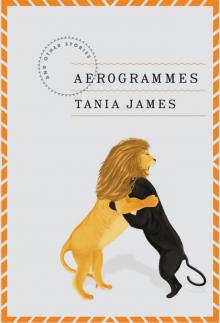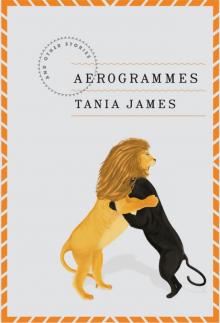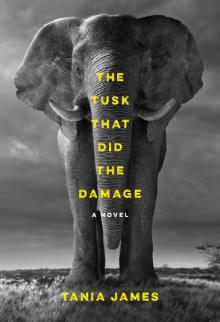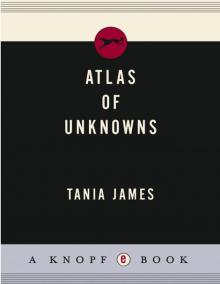- Home
- Tania James
The Tusk That Did the Damage
The Tusk That Did the Damage Read online
ALSO BY TANIA JAMES
Atlas of Unknowns
Aerogrammes
THIS IS A BORZOI BOOK PUBLISHED BY ALFRED A. KNOPF
Copyright © 2015 by Tania James
All rights reserved. Published in the United States by Alfred A. Knopf, a division of Random House LLC, New York, and distributed in Canada by Random House of Canada Limited, Toronto, Penguin Random House companies.
www.aaknopf.com
Knopf, Borzoi Books, and the colophon are registered trademarks of Random House LLC.
Library of Congress Cataloging-in-Publication Data
James, Tania.
The tusk that did the damage / by Tania James.
pages cm
ISBN 978-0-385-35412-7 (hardcover)—ISBN 978-0-385-35411-0 (eBook) 1. Elephants—India—Fiction. 2. Poaching—India—Fiction. 3. Documentary films—Fiction. 4. Wildlife conservation—India—Fiction. 5. India—Economic conditions—Fiction. I. Title.
PS3610.A458T88 2015
813′.6—dc23
2014014521
This is a work of fiction. Names, characters, places, and incidents either are the product of the author’s imagination or are used fictitiously. Any resemblance to actual persons, living or dead, events, or locales is entirely coincidental.
Front-of-jacket photograph by Chris Clor/Bend Images/Getty Images
Jacket design by Gabriele Wilson
v3.1
FOR RACHEL KURIAN AND MARIAKUTTY LUKOSE,
THE MATRIARCHS
Contents
Cover
Other Books by This Author
Title Page
Copyright
Dedication
Epigraph
Chapter 1: The Elephant
Chapter 2: The Poacher
Chapter 3: The Filmmaker
Chapter 4: The Elephant
Chapter 5: The Filmmaker
Chapter 6: The Poacher
Chapter 7: The Elephant
Chapter 8: The Filmmaker
Chapter 9: The Poacher
Chapter 10: The Elephant
Chapter 11: The Filmmaker
Chapter 12: The Poacher
Chapter 13: The Elephant
Chapter 14: The Filmmaker
Chapter 15: The Poacher
Chapter 16: The Elephant
Chapter 17: The Filmmaker
Chapter 18: The Poacher
Chapter 19: The Filmmaker
Chapter 20: The Poacher
Chapter 21: The Filmmaker
Chapter 22: The Poacher
Acknowledgments
A Note About the Author
COLONEL HATHI: A Man-cub! [picking up Mowgli with trunk] Oh, this is treason! Sabotage! I’ll have no Man-cub in my jungle!
MOWGLI: It’s not your jungle!
—from the 1967 Disney film The Jungle Book
There is nothing left of my home
so I carry my home with me
—Lisa Ciccarello, “One Way of Doing Battle”
The Elephant
He would come to be called the Gravedigger. There would be other names: the Master Executioner, the Jackfruit Freak, the great Sooryamangalam Sreeganeshan. In his earliest days, his name was a sound only his kin could make in the hollows of their throats, and somewhere in his head, fathoms deep, he kept it close.
Other memories he kept: running through his mother’s legs, toddling in and out of her footprints. The bark of soft saplings, the salt licks, the duckweed, the tang of river water, opening and closing around his feet. He remembered his mother taking him onto her back before launching herself from the bank. In this way, their clan would cross, an isle of hills and lofted trunks.
Among them were two males, a broody old tusker and a twelve-year-old with ivory stubs he was always admiring with the tip of his trunk. As they roamed, the tusker brought up the back of the clan, but if a man were scented somewhere in the vicinity, the cows dropped their doings and circled the two tuskers. They knew what man was after. They offered their rumps instead.
They had walked the same routes for years, this clan, routes that the Forest Department would carve into foot trails of its own. They knew every bend and border, each rutted skull and bull they would meet along the way. But the Gravedigger hadn’t learned all there was to learn. His trunk, being stout and clumsy, couldn’t sense what his mother’s could sense—the sudden stillness in the rhythm of things, the peril in the air.
§
The Gravedigger was a few years old when it happened, still new to the world, but old enough that his mother had gone and calved another one. The newborn was a clumsy little cowpat. She toddled within the pillars of his mother’s legs precisely where he used to toddle. Whenever he tried to double back and regain her shade, his mother grumbled and nudged him onward with her trunk. If he fell behind, she flicked her tail until he grasped it, the two walking in tandem, ever in touch.
They emerged from the forest cover to the murky, algal smell of the lake. The water opened wide before them. The Gravedigger was first to splash into the lake, while the cowpat balked at the edge creeping darkly toward her feet. The old tusker slung his trunk into the air and dashed water over his spine.
Toward dusk, they roamed up the mountainside. Shola forest melted into grassland, staked here and there with shrub and tree built stout to withstand the cool. The wind had slackened by then and did not carry down to them, as it usually would, the smell of the man waiting among the branches of an evergreen.
A blast split the silence. The Gravedigger staggered, caught in a carousel of legs and screaming. The man in the tree was pointing a long-snouted gun. Another blast—the tusker bellowed deep and doomed. The Gravedigger whirled in search of his mother, and when at last he caught her scent, he found her roaring in the face of the gunman who aimed into her mouth and shot.
Her head snapped back. Her front feet lifted off the ground for one weightless moment, before lowering, folding beneath her. The whole of her sank with a thud that traveled the earth and ran like a current into the tender slabs of the Gravedigger’s soles.
He went to her. He touched her warm trunk, stretched straight but slack. He touched its ridges and folds, and the very tip, a single, empty finger with which she had pinched him a gooseberry not two hours before. A charred scent from her wound. No air from her nostril, no light in the eye.
All around: the stink of gunmetal and smoke.
He watched as two men climbed over the old tusker’s face. They pushed and pulled a saw across the bridge of the trunk. Blood spilled over their hands, over the air, as the trunk rolled limply to the ground. They chiseled at one side of a tusk, chipping at flesh, and knocked a hammer on the other side, some chipping, some knocking, until they gently tipped the tusk from the root, easy as a fruit.
They did this to the tusker and the almost-tusker, neatly and quietly opening each face. And then they noticed him.
One man strode toward the Gravedigger, his hair smelling of a sticky odor, some chemical scent mixed with pineapple rot. With the man’s every step, the world seemed to tighten. He was holding a knife.
The Gravedigger smelled urine streaming down his leg. He pressed himself against his mother’s still warm belly and waited to die.
The man walked past the Gravedigger, around his mother’s flank. The Gravedigger could not see what the man was doing. All he heard was the soft squeal of the knife. All he smelled was the pineapple rot.
At last the man rounded her body again and walked away, back to his people. A severed tail flicked from his fist, beckoning.
The Poacher
Everyone in Sitamala thinks they know my brother’s story. On the contrary. They may know the tune, but I would bet a half bag
of pepper the words are all wrong. I blame his wife’s people for spreading slander, all those perfidious huge-hipped sisters, not a one half as lovely as Leela.
Our father was a rice farmer. He came from a time when to farm was a noble profession, when people sought our gandhakasala and our rosematta for their earthy fragrance superior to the stuff that now comes cheap from Vietnam. Who can remember those times with all these farms lying fallow and many a farmer’s son gone to roost in a soft office chair? And who am I to blame them, I who have seen the Gravedigger for myself and felt its breath like a steam on my face?
Some say my brother stepped into the very snare he laid for the elephant. I say opinions are cheap from far. I will take you to the Gravedigger myself and let you meet its honey-colored eye. I will show you the day it first laid its foot on our scrawny lives. Then you tell me who was hunter and who was hunted.
§
To know our troubles, you must know what happened to my cousin Raghu. When I think on poor Raghu, I see him stoking a small fire. I see him nudging a stick aside so as to let the flames breathe. I have called up this image many a time as if I were with him in the palli as I should have been that night.
The palli was a paddy-roofed matchbox on bamboo legs stranded in the midst of his father’s rice field, same as the ones in the neighboring fields. If a herd of elephants were to come glumping their way through the stalks, we were to wave the lantern and give the long caw that would set the others cawing. If this didn’t scare the herd away, we used crackers and rockets. But the herds became wise to our ways. They learned that our racket had no teeth to it, so they kept on eating their way through six months’ worth of our back-bent work. Sometimes we had to call the Forest Department; it would send three or four men to blind the beasts with headlights and fire ancient rifles. We called them greenbacks for their dingy green uniforms and their love of currency.
The herds were mostly cows, and they meant no personal harm unless you tampered with a calf. There is no one more fearsome than a mother enraged. In my youth I heard of a cow that cradled the carcass of her baby for days and would not be deprived of it.
Now the solo bull could be a very rude intruder. If one of those fellows were to pay us a visit, we were to leap out of the palli and race home. Do not be fooled by the lumps you see at the zoo—the elephant can run! Ask Raghu’s father, who was only twenty years old when a bull elephant discovered him dozing in the palli. Synthetic Achan survived because he knew the elephant has weak eyes. Run straight and you will be trampled. Cut a zigzag and you may confuse it.
Synthetic Achan felt Raghu was too young to sit guard in the palli alone, so he drafted me also. Yet I do not know where I was that night, probably testing my luck with some soft-bottomed girl. What to say. I was nineteen and had discovered that my visage had an effect on certain girls, so to speak. I pretended not to care about my visage, but Raghu needled me about the cream I occasionally raked through my hair. Sometimes he called me Styleking as in: “Eh Styleking, did you bathe in Brylcreem or stick the whole tub up your rump?”
“Yamini likes it.”
“Up the rump?”
“Do not talk of her rump.”
“I hear what I hear. And from the particulars, I would not touch her with a boatman’s pole.”
We bickered, but there was a comfort to our fuggy odors and the flash of our teeth in the dark. Other times we burrowed into the quiet, each of us privately wondering what kind of future awaited us. I had a habit of dozing, which Raghu allowed to a limit and would shake me awake only if I were to poof. “What is this,” he would shout, flapping his hands about his face, “your personal shithouse?”
Whenever he gently tapped me awake, I knew I had been murmuring for my brother, something like Where is Jayan where is he, even though Jayan had been home for six months already. To spare me the shame, Raghu would only say I had been poofing again.
Humble as it was, our palli commanded a five-star view. To the north a phone tower climbed the sky. To the east an owl glared from its bamboo perch, swiveling its head for rodents among the stalks. To the west we watched the sunset pour over the teak-rimmed forest aka Kavanar Wildlife Park.
Our people had been walking the forest long before it took that fussy name. The new laws forbid us from doing anything in the park, not walking, not even picking up a finger length of firewood without being fined for trespass and stealing. Stealing from trees that had dropped us fruit and firewood for centuries! Meanwhile, the laws looked kindly on the greenbacks and timber companies, their rows of rosewood, eucalyptus, teak.
So I had zero patience for Raghu’s ramblings when he decided to tell all about the spectacle he had witnessed one day prior, starring his brand-new hero: Ravi Varma, Veterinary Doctor. I had never seen this Ravi Varma, M.D., though I had heard of his exploits with the greenbacks, and I was no fan of theirs nor his by association.
And what heroic feats had the cow doctor performed to deserve Raghu’s worship? Pulled an elephant calf from a tea ditch, where the wee thing had tripped and fallen much to its mother’s distress.
I told Raghu my demented old mammachi could pull an elephant calf from a tea ditch.
“Not only that,” Raghu enthused. “The vet doctor got the mother to take back the baby.”
Now this part was pure lie. “A mother elephant won’t touch a calf that was handled by humans. Every idiot knows that.”
“But she did! And she thanked him after.”
“Did they shake hands too?”
“And two sayips were there, filming it all. BBC people I think.”
This gave me pause. In those days, it was rare to see foreigners in our parts, and we were neither poor enough nor princely enough to appear on Western screens. I was minimally intrigued. What did the BBC want with us?
Raghu sighed, still dazzled by the memory of Ravi Varma, M.D. “It was something, Manu, I tell you.”
Was Raghu musing about the mother and calf on his final evening? Did that sentimental memory lead him to lay down his guard? I imagine his last and lonesome hour, I see him drifting off, a breath from sleep, before he sits up quick to the snap of a broken branch.
In the silence he looks from one doorway to the other. He can open his lungs and caw and set the other pallis cawing, but what if it was only the snap of the fire? He hears me scoffing in his ears: A broken branch in the middle of a field?
Raghu hunkers beneath his blanket, hiding from the possibilities.
After a noiseless minute he can breathe again, relieved he never set to squawking like some half-brained bird. He draws deep on the comfort of woodsmoke, sure I will come. Until then, he will tend the fire alone.
The Filmmaker
Along time ago, when the mountains bristled with forest, a boy emerged from the woods and came upon a white man with china-blue eyes. The white man was a British engineer, sent to cut a royal road through the mountains, but he couldn’t find a path. He wasn’t an explorer, and this was some dense and secretive terrain. Couldn’t the boy, being a local and privy to local secrets, just show him the way?
The boy demanded cash and the watch on the engineer’s wrist.
Proffering the watch—cash later—the engineer trailed the boy into the mountains, tracing a route tamped by elephant feet. Every so often the boy stopped and said he had to go home because his mother was waiting; he hadn’t the time to go all the way to the peak. Just a bit farther, the engineer kept urging, just a bit more.
At sundown they reached the peak. The man squinted at the mountains beyond and smiled as if he’d come into some great inheritance. Happy now? the boy said. Now give me my money.
Just a minute, said the engineer, reaching into his coat pocket.
I don’t have any more minutes, the boy insisted.
True, said the engineer, leveling his pistol, and shot the boy in the face.
The engineer slipped the watch off the dead boy’s wrist. He thought about the bigger watch he’d buy once the road was built and named af
ter the Englishman who had single-handedly found a route through the ghats.
As it turned out, the bullet gave the dead boy all the time in the world. Many years later, his spirit took up residence in the hollows of a banyan, along the road the engineer had built, and overturned cars as a means of revenge. Only when a priest wrapped the tree in chains was the spirit contained, and cars could once again barrel freely round the bend. Thereafter it was known as the Chain Tree.
§
I leaned out the taxi window to catch a glimpse of the Chain Tree. I’d heard the legend on my first day at Kavanar Wildlife Park and was expecting a hulk more twisted and mythic. In fact, the banyan looked benign, with chains dangling like party streamers from the branches.
The road itself was far more intimidating, all rubble and rollick and switchback. Our taxi driver seemed to think himself invincible, maybe even immortal, the way he dodged cars, scooters, lorries, mini-lorries, tipper-lorries, and a band of pedestrians with hankies tied round their mouths, to fend off dust. A rosary hanging from the rearview mirror spanked the back of the driver’s hand. He took no heed of the rosary, or of the road signs that every so often shot by:
BE A CARELESS OVERTAKER
END UP AT THE UNDERTAKER
I was nervous about the shoot; the signs didn’t help. Beside me, Teddy sat staring out his window, placid and daydreamy.
“We should’ve rented a second camera,” I said.
“Then who would do sound?” Teddy said.
“Mount a mic on the camera. People do that all the time.”
Teddy frowned at the idea. He was a purist about sound quality, though he rarely volunteered to take sound himself.
“I don’t know how we’re going to get everything with just one camera,” I said.
“We’re not going to get everything, Em. Once you accept that, it’s really liberating.”

 Aerogrammes: And Other Stories
Aerogrammes: And Other Stories Aerogrammes
Aerogrammes The Tusk That Did the Damage
The Tusk That Did the Damage ATLAS of UNKNOWNS
ATLAS of UNKNOWNS